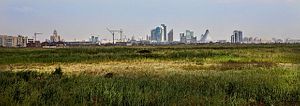Over the weekend an estimated 1,000 people gathered in Atyrau for an unsanctioned public protest over pending changes to Kazakhstan’s land code. Kazakh president Nursultan Nazarbayev pushed back Tuesday on the protests, pledging that “those who spread false information, saying that the land will be sold to foreigners, must be apprehended and punished.”
Sparked by rumors that public lands would be sold to foreigners, activists applied to hold a rally in Atyrau. Ak Zhaik, an Atyrau-based newspaper, said that the application was denied by local authorities but the gathering took place anyway. While some sources put the number of protesters in the hundreds, Ak Zhaik says eventually there were “several thousand.” RFE/RL has video of the protests that supports the claim of at least a few hundred present–and certainly a few hundred more than Kazakh authorities are comfortable with.
The changes to the land code–which open state-owned land to privatization and possible renting by foreigners–were signed into law in November 2015 but are due to go into effect on July 1.
As Aigerim Toleukhanova points out for Eurasianet, Kazakhstan is the ninth largest country by area in the world and “is well-stocked on the land front”:
The country has 2.7 million square kilometers of farming land stock, of which around one-third is unused, according to the National Economy Ministry. Another 602,000 square kilometers is made up [of] residential space, industrial areas and protected nature reserves.
The land code changes (which, if you were wondering, fall into the third of five structural reforms Kazakhstan plans on accomplishing with 100 Concrete Steps), would make unused land available for purchase by Kazakh citizens or joint ventures or for rent by foreigners for up to 25 years via land auctions. The proceeds would be directed into the National Fund, the state’s sovereign wealth fund built up over years from oil and gas revenues but now deflating due to economic stress.
As the Wall Street Journal reported in January, the fund could run dry in less than decade. In fact, comments to the WSJ made by the fund’s then-manager Berik Otemurat led to his firing. He said, “We are eating up the National Fund” and commented also that he was speaking publicly because the lack of transparency was a problem: “Transparency should put more pressure and accountability on the government as to how they manage these funds.”
Public protests are rare in Kazakhstan. In January a few dozen people protested banks in Almaty over soaring mortgage costs associated with the tenge’s rapid depreciation. While the land code protest Sunday was peaceful–the crowd was reportedly addressed by the regional governor, watched by plain-clothed police, and ignored in state media–minds jump to the last major protest in Kazakhstan’s west, the 2011 Zhanaozen protest. Zhanaozen was labeled a “massacre” after security personnel opened fire on protesting oil workers, killing more than a dozen.
The land code changes touch on not just overarching concerns about transparency and corruption but also local nerves regarding foreigners–who come to the area for work. In a 2015 paper for the Journal of Eurasian Studies, Dossym Satpayeva and Тolganay Umbetaliyeva comment that the difference in pay between local and foreign specialists “is a source of tensions in the Kazakh oil and gas industry.”
Nazarbayev, speaking on Tuesday, promised to “punish provocateurs” ostensibly behind the protests. While objectively it makes sense to make money off unused land–by selling and renting it–Astana’s lack of sensitivity to local objections isn’t bound to bolster much-needed trust between people and their government.

































